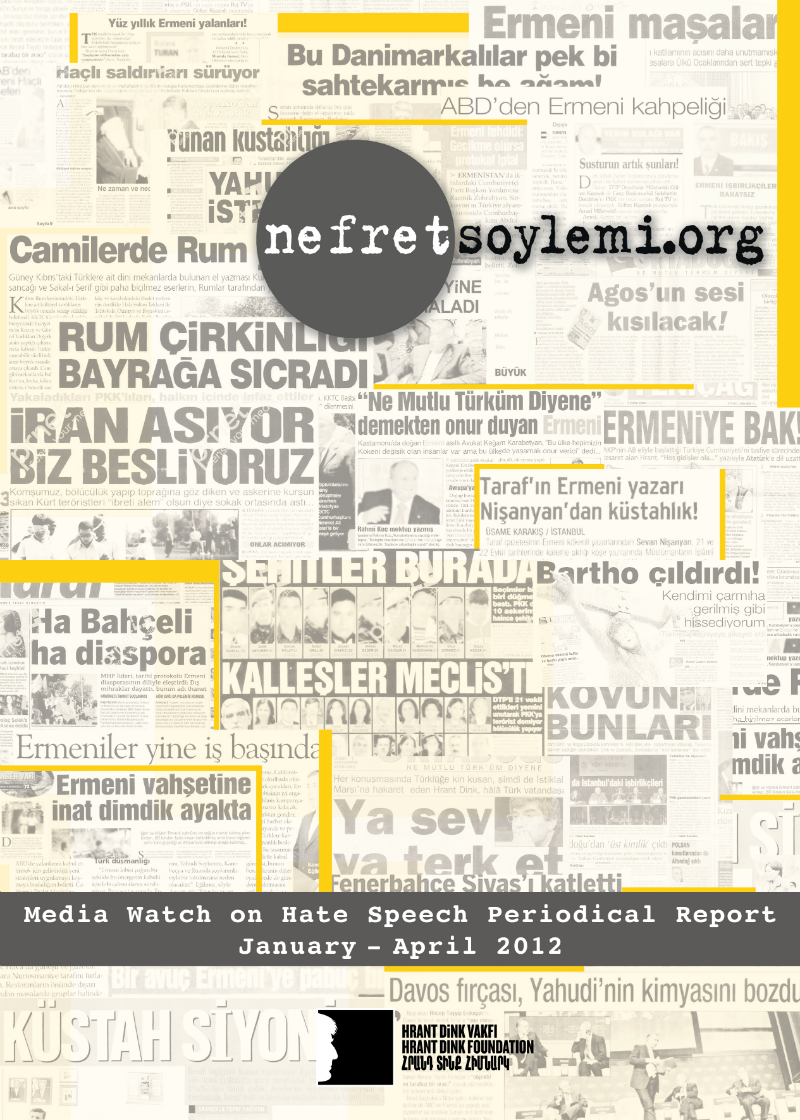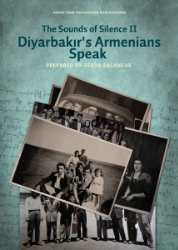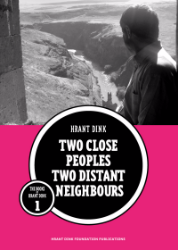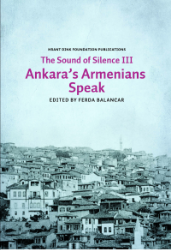In the scope of the “Media Watch on Hate Speech Project”, we publish periodical reports every four months based on the findings of our media monitoring work. Our reports illustrate a general picture of hate speech employed by the Turkish print media, including statistical information on the groups that were targeted, where hate speech was encountered the most, how hateful discourse was constructed, the events related with the production of such discourse etc. in the period analysed, together with sample news articles and columns subjected to critical discourse analysis.
We have so far published and disseminated eight reports to NGOs, universities, newspaper editors and related institutions such as the Press Council and Journalists’ Association of Turkey. The media watch report covering the months of January, February, March, and April 2012 is our first report that we also translated into English.
January – April 2012 Media Watch Report
In the period between January and April 2012, we observed a striking quantitative increase in the number of news articles and columns that resorted to hate speech. Similar to the previous periods, hate speech was most frequently encountered in columns as opposed to news stories. And once again, the national press used the hate discourse more often than the local press.
Most of the news articles and columns that featured hate speech have targeted Armenians who were followed by Christians and Jews, and then by Rums. The group that was the target of hate speech the most was Armenians, followed by Christians in general and Jews. Hate speech against Armenians was constructed in relation with three events: Reaction given to the verdict that concluded the Hrant Dink murder case, the French bill on the criminalization of the denial of the Armenian genocide, and the rally that was organized to commemorate the 20th anniversary of Khojaly events. What stands out in hateful discourse against Armenians, in which “being Armenian” has been used with a negative connotation, is the insult towards the people who reacted to Hrant Dink’s murder by chanting the slogan “We are all Armenian”. Regarding the bill in France, there were expressions that denigrated Armenians and were hostile towards the French, while debates around the Khojaly rally have been built on the emphasis that “Armenians are Turcophobes, treacherous perpetrators of massacres”. In addition to these headings, in the period before and after April 24th, Armenian genocide commemoration day, there have been many columns and news articles published with a view to deny allegations of genocide or prove that it was the Armenians who massacred the Turks.
Majority of the hate speech elements against Christians, as was the case in previous periods, are the news items that featured the theme “the Crusader mentality”. In some of these news items, Armenians and Jews are also targeted, with an emphasis that these groups “cannot be friends to Muslims”. Another interesting point is that in the very same period, many writers, on different grounds, made references to the 51st ayat of the Maide Surah (verses from the Quran), which advices “not to befriend/ally with Christians and Jews”.
Finally, hate speech targeting Rums is built on describing Rums as “treacherous and collaborative (with the enemy)” and portraying them as a threatening element, in such a way that it has nothing to do with a specific agenda except for the criticism of the Cyprus policy.
As in the previous period, discriminatory discourse against Kurds was constructed through the pro-Kurdish Peace and Democracy Party (BDP). Since speech targeting political parties and politicians are considered in the scope of freedom of expression, stories targeting the BDP were not included in the statistical analyses. However, in these stories Kurds who demanded their rights were represented as the “bad Kurds”, were called “separatists” and they were marginalized through the BDP. In the content that targeted Kurds, it was implied that the Laz, Circassians, Albanians, and Bosnians also carry a threat potential just as the separatist Kurds.
The report also included news stories and columns targeting LGBT individuals and women. We observed that in most of the homophobic contents, homosexuality was defined as a “perversion/sickness” while transvestites and transexuals were presented as threats to society.
- Report name
- Media Watch on Hate Speech January - April 2012
- Original name
- Medyada Nefret Söylemi Ocak - Nisan 2012 (2012)
- Price
- Free
- Pages
- 65
- Width
- 210 mm
- Height
- 295 mm
- Printing
- May 2012
- Language
- English
- Project Coordinators
- Nuran Gelişli, Melisa Akan
- Analyst
- Ceyda Ulukaya
Media Watch on Hate Speech Project is funded by Global Dialogue, Friedrich Naumann Foundation, and the British Embassy. The views expressed in this report do not necessarily reflect the views of the funders.
- Monitoring Hate Speech in the Media
- Monitoring Hate Speech in National and Local Newspapers in Turkey
- Findings
- News Items Selected in the Period January - April 2012
- Examples by Categories
- 1) Exaggeration / Distortion / Attribution
- Attempting to Influence the Judiciary
- ASIMDER Warns : Armenian Community and Foundations Buying out Van
- 2) Blasphemy / Insult / Denigration
- “The Word Armenian Brings Sickness to Mind”
- Why Does Christo-Fiasco Want to Talk to Erdogan?
- 3) Enmity / War Discourse
- Friends of Christians and Jews!
- We are Turks, Like Those in Khojaly. Dink was Armenian, and You?
- Circassians After Kurds
- 4) Symbolization
- A Jew to Represent Turkey in Eurovision? The Bonomo Unrest
- Church Visit from BDP in the Week of Holy Birth
- 1) Exaggeration / Distortion / Attribution
- Other Disadvantaged Groups
- The Image of Izmir
- BDP Asks for Protection for Deviants
- Harms of Flirting
- Media Criticism
- Newroz: The Festival of Separatists
- Armenian Atrocities: It was Actually the Armenians Who Massacred the Turks
- Meral Okay: That Woman Died
- Turcophobe Mahçupyan/Hrant-Supporter Çetin




